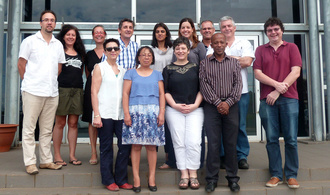Plant health - Beginnings of a training network
Written by Modified on the
An international workshop was held in early February 2015 at the Plant Protection Platform (3P) in Saint-Pierre, Reunion Island. The workshop was an exploratory project, bringing together several universities from Belgium[1] and the southwestern Indian Ocean as well as research units specialized in plant health[2] from the Labex Agro[3]. It aims to create an international training network dedicated to tropical plant health.
Claire Neema, director of the Plant-Parasite Joint Research Unit (UMR BGPI), professor at SupAgro Montpellier and project co-coordinator with Stéphane Poussier (University of Reunion - UMR PVBMT) granted us an interview as she returned from the workshop.
Bio&Agri – In what context is this training network implemented?
Claire Neema - The fight against crop losses caused by pests and pathogens has long been a major challenge for the countries of the Southwest Indian Ocean. Several plant health projects - including PRPV, IRACC, ePRPV and Germination - have helped bring about scientific and technical cooperation, particularly via scientific publications and technical achievements, such as the fight against coconut whiteflies and the development of diagnostic methods. There are currently very few genuine cooperative training projects between the southwestern islands of the Indian Ocean (SWIO).
B&A - This workshop was the first opportunity for you to evaluate training and educational resources in plant health in the SWIO. How do things look?
CN - Each partner has different training needs in the areas of training and capacity building. The universities in the region all offer general biology training, but few of them specifically teach integrated protection of tropical plants. We need to offer a range of courses to train more qualified plant health professionals in the SWIO region.
The idea is to set up sessions where knowledge and best practices can be exchanged between teachers, share e-learning resources, implement new specializations, or propose training sessions for university academic staff and professional on the islands. A joint Masters module entitled "Integrated protection of tropical plants" is being discussed between Montpellier SupAgro (Master Agrodesign[4]) and the University of Reunion (BEE Master/BEST-T Biodiversity-Ecology-Evolution, Biodiversity and terrestrial tropical ecosystems). However, we want to go further, offering this possibility to the whole area, and promoting student and teacher mobility.
In short, our goal is to offer a range of research-based training courses at undergraduate, graduate and further education levels.
B&A - This project is not just about creating innovative regional training programs, is it?
CN – Indeed, we hope to create better links between SWIO universities, European universities and Labex Agro research units in France to ultimately create and roll out a tropical plant health management network. Montpellier Supagro and the University of Reunion Island are the main partners.
More broadly, our goal is to promote research, innovation and technology transfer in reducing the impact of pests on major tropical crops and the development of eco-friendly control methods. For example, in recent years, the Labex Agro scientific community has developed tools and diagnostic methods for detecting emerging diseases. These methods and future developments will hopefully be implemented in the field and transferred to our partners in the IO area who, through the training provided will be able to fully incorporate them into their production methods.
Stéphane Poussier, founder of the network, explains in this interview recorded at the 3P in Saint-Pierre the ins and outs of his project. The Dean of the Faculty of Agriculture of the University of Mauritius, Yasmina Jaufeerally-Fakim and the Director of Environmental Sciences of the University of Seychelles, Kelly Hoareau, also play an important role. During the workshop in February 2015 in Reunion Island, they gave a presentation of their universities and expressed their expectations about future collaborations:
Contacts :
Stéphane Poussier : stephane.poussier@univ-reunion.fr
Claire Neema : claire.neema@supagro.fr
[1]
Université des Comores, Seychelles University, University of Mauritius, Université d’Antananarivo (Madagascar), Université de La Réunion, Université Catholique de Louvain (Belgique).
[2]
UMR PVBMT (Peuplements Végétaux et Bio-agresseurs en Milieu Tropical), UMR BGPI (Biologie et Génétique des Interactions Plante-Parasite), UMR IPME (Interactions Plantes Micro-organismes Environnement), UR Bio-agresseurs.
[3]
The “Laboratoire d’excellence Agronomie et développement durable” (Labex Agro), run by the Agropolis Foundation (Labex Agro), aims to make Montpellier the global scientific center for plant and agronomic research dealing with issues including the adaptation of agriculture to climate change, the demand for food and non-food plants, risk management and sustainable development.
[4]
Master « Design of productive healthy and sustainable cropping systems in the Mediterranean and tropical regions ».


